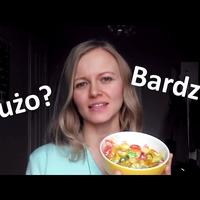Polish lesson with Dorota: Dużo czy bardzo?
|||Dorota|||
Polnischunterricht mit Dorota: Viel oder wenig?
Polish lesson with Dorota: A lot or a lot?
Clase de polaco con Dorota: ¿Mucho o bastante?
Leçon de polonais avec Dorota : Beaucoup ou beaucoup ?
Lezione di polacco con Dorota: tanto o poco?
Aula de polaco com Dorota: Muito ou pouco?
Урок польского языка с Доротой: много или мало?
Урок польської з Доротою: багато чи мало?
Jestem Dorota
|Dorota
Я є|
I'm Dorota
Я Дорота
i dzisiaj opowiem Wam o różnicy między
||I will tell|||difference|between
||racconterò||||tra
|сьогодні||||різниці|між
||||||entre
Und heute werde ich euch über den Unterschied zwischen
and today I will tell you about the difference between
"dużo" i "bardzo".
viel||sehr
a lot||very
багато||
mucho||muy
molto||molto
"viel" und "sehr" erzählen.
"a lot" (dużo) and "very" (bardzo).
Jest to częsty problem
||häufiger|
it is||common|problem
||frequente|
Das ist ein häufiges Problem
It's a common problem
u moich uczniów, więc...
|my|my students|so
||alunni|
||alunos|
bei meinen Schülern, also...
of my students, so...
Dużo.
viel
Viel.
"A lot" (dużo)
Kiedy mówić "dużo"?
when||
Wann sagt man "viel"?
When to say "a lot" (dużo)?
"Dużo" to znaczy "ile".
||bedeutet|wie viel
||means|"how much"
|||quanto
|||cuánto
|||quanto
"Dużo" to znaczy "wie viel".
"A lot" (dużo) means "how much? how many?"
Musicie zadać sobie pytanie
|ask||question
Ihr müsst euch die Frage stellen
You need to ask yourself a question
"ile?"
"wie viel?"
"how much? how many?"
Mam dużo pieniędzy.
||Geld
||money
||dinero
Ich habe viel Geld.
I have a lot of money.
Ile? Dużo!
Wie viel? Viel!
How much? A lot!
Sto złotych, dwieście złotych.
||zweihundert|
one|zloty|Two hundred|
||duecento|
cem|zlotys|duzentos|
Hundert Zloty, zweihundert Zloty.
100 zlotys, 200 zlotys.
Mam dużo pieniędzy.
Ich habe viel Geld.
I have a lot of money.
Mam...
Ich habe...
I have...
dużo cukierków.
|конфет
|Bonbons
|a lot of candy
|caramelle
|doces
viele Bonbons.
a lot of candy.
Ile? Jeden (1) cukierek, dwa (2) cukierki,
||||caramelos
||Süßigkeit||candies
It||candy||candies
||caramella||caramelle
||doce||
Wie viele? Ein (1) Bonbon, zwei (2) Bonbons,
How many? One candy, two candies,
trzy (3) cukierki, cztery (4) cukierki,
|||candies
|doces||
drei (3) Bonbons, vier (4) Bonbons,
three candies, fours candies,
pięć (5) cukierków...
|candies
|caramelle
cinco|cinco caramelos
fünf (5) Bonbons...
five candies....
trzydzieści trzy (33) cukierki.
dreißig||
thirty|three|
Dreiunddreißig (33) Bonbons.
thirty three candies.
Ile? Mam dużo cukierków.
|||caramelle
Wie viele? Ich habe viele Bonbons.
How many? I have a lot of candy.
Hm?
Hm
Hm?
Hm?
Włosy.
Hair.
cabelo
Cabello.
capelli
Haare.
Hair.
Jeden włos, drugi włos, trzeci włos, łoo...
||||||лука
|Haar|||dritte Haar||wow
one|hair|second|hair|third|hair|Whoa
|||||capello|łoo
|cabelo|||||uau
Ein Haar, ein zweites Haar, ein drittes Haar, oh...
One hair, the second one, the third one, wow...
mam dużo włosów!
||волос
||Haare
||hair
||cabelo
tengo|mucho|
ich habe viele Haare!
I have a lot of hair!
Ile? Dużo.
How much? A lot.
A jeśli chodzi o "bardzo",
||es geht||
|if|||
Und was "sehr" betrifft,
And when it comes to "very" (bardzo),
mówimy wtedy o intensywności.
|||интенсивности
|||Intensität
we speak|||intensity
|||інтенсивності
|então||intensidade
wir sprechen dann von Intensität.
then we talk about intensity.
Te cukierki są bardzo dobre,
||||good
|caramelle|||
Diese Süßigkeiten sind sehr gut,
These candies are very good,
są bardzo smaczne,
||very tasty
||buone
||saborosas
sie sind sehr lecker.
are very tasty,
są bardzo kolorowe.
||цветные
||buntig
||colorful
sind sehr bunt.
are very colourful.
Dzisiaj jest bardzo zimno.
Heute|||
today|is|very|cold
Heute ist sehr kalt.
Today is very cold.
Albo: dzisiaj jest bardzo ładnie.
||||nice
||||bonito
Oder: heute ist sehr schön.
Or: today is very nice.
Dzisiaj jest bardzo ładna pogoda.
||||weather
|||bonita|
Heute ist das Wetter sehr schön.
Today the weather is very nice.
To znaczy, gramatycznie
||grammatikalisch
||grammatically
Das bedeutet, grammatikalisch,
This means, grammatically
po "dużo" musicie mieć rzeczownik
nach||müsst||
||||noun
||dovete||
||debéis||sustantivo
nach "viel" müsst ihr ein Substantiv haben.
after "dużo" you must have a noun
после "много" должно стоять существительное
w dopełniaczu.
|im Genitiv
|"in the genitive"
|genitivo
|genitivo
im Genitiv.
in the genitive case.
в родительном падеже.
Dużo pieniędzy,
|Geld
|soldi
Viel Geld,
A lot of money,
dużo cukierków,
|caramelle
viele Bonbons,
a lot of candies,
dużo włosów.
|Haare
|hair
|capelli
viele Haare.
a lot of hair.
Bardzo. Po bardzo musicie mieć
||||haben
very|after|very|you must|have
|||dovete|
Sehr. Ihr müsst sehr haben
"Very" (bardzo). After "very" (bardzo) you need to have
przymiotnik albo przysłówek.
||наречие
||Adverb
adjective||adverb
aggettivo||avverbio
adjetivo||advérbio
ein Adjektiv oder ein Adverb.
an adjective or an adverb.
Bardzo dobry, bardzo ładna,
|good||
|||bella
Sehr gut, sehr schön,
Very good, very pretty,
bardzo fajnie, bardzo ciepło.
|хорошо||
very|cool|very|warm
|||quente
|||muy cálido
sehr schön, sehr warm.
very nicely, very warm.
Jeszcze raz:
one more|again
Noch einmal:
Once again:
"dużo" - ile?
|quanto
"a lot" (dużo) - how much? how many?
"много" - сколько?
"bardzo" - intensywność, jak?
|интенсивность|
|Intensität|
|intensity|how
|intensidade|
"bardzo" - Intensität, wie?
"very" (bardzo) - intensity, how?
Możecie to połączyć:
||verbinden
You can||You can combine it
||unire
||unir
Könnt ihr das verbinden:
You can put it together:
Вы можете комбинировать это:
"bardzo dużo".
"bardzo dużo".
"a lot" ["an awful lot of"]
"много".
Mam bardzo dużo cukierków.
I have|||
|||caramelle
Ich habe sehr viele Bonbons.
I have a lot of candy.
Jeśli macie jakieś pytania,
|you have|any|
||alcune|
Wenn Sie Fragen haben,
If you have any questions,
to piszcie w komentarzach.
|write||in the comments
schreiben Sie in den Kommentaren.
write them in comments.
Na razie! Miłego dnia!
||schönen|
For now|for now|Have a nice|
|por enquanto|bom|
|Por ahora||
Bis bald! Einen schönen Tag!
Bye! Have a nice day!

